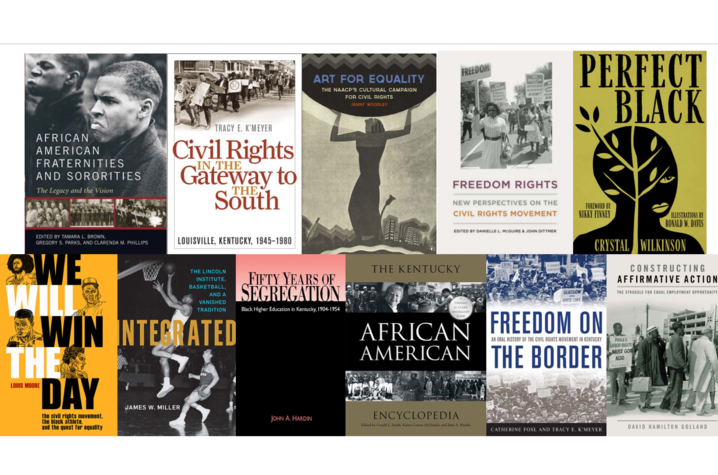By Danielle Donham

Looking to learn more about the history of Juneteenth and civil rights in Kentucky? The University Press of Kentucky’s Civil Rights catalog has you covered.
With titles spanning the topics of African American studies, race and sports, and the struggle for Black equality, there are plenty to choose from.
Several of the titles in the catalog are authored and edited by University of Kentucky faculty members and community members, including Gerald L. Smith, Derrick E. White, Crystal Wilkinson — all faculty in the UK College of Arts and Sciences — and former faculty member Nikky Finney. The press is currently running a sale through June 30 on civil rights and African American studies titles on their website, so it’s the perfect time to stock up.
A limited sampling of titles are listed below, with the entire Civil Rights collection available at this link.
African American Studies
- “African American Fraternities and Sororities: The Legacy and the Vision” second edition, edited by Tamara L. Brown, Gregory S. Parks and Clarenda M. Phillips.
- The Kentucky African American Encyclopedia edited by Gerald L. Smith, Karen Cotton McDaniel and John A. Hardin.
- “Perfect Black” by Crystal Wilkinson, illustrated by Ronald W. Davis with a foreword by Nikki Finney.
Civil Rights
- “Civil Rights in the Gateway to the South: Louisville, Kentucky, 1945-1980” by Tracy E. K’Meyer.
- “Fifty Years of Segregation: Black Higher Education in Kentucky, 1904-1954” by John A. Hardin.
- “Freedom on the Border: An Oral History of the Civil Rights Movement in Kentucky” by Catherine Fosl and Tracy E. K’Meyer.
“Race in Sports” series edited by Gerald L. Smith and Derrick E. White
- “Integrated: The Lincoln Institute, Basketball and a Vanished Tradition” by James W. Miller.
- “We Will Win The Day: The Civil Rights Movement, the Black Athlete, and the Quest for Equality” by Louis Moore.
“Civil Rights and the Struggle for Black Equality in the Twentieth Century” series edited by Steven F. Lawson, Cynthia G. Fleming and Hasan Kwame Jeffries
- “Art for Equality: The NAACP’s Cultural Campaign for Civil Rights” by Jenny Woodley.
- “Constructing Affirmative Action: The Struggle for Equal Employment Opportunity” by David Hamilton Golland.
- “Freedom Rights: New Perspectives on the Civil Rights Movement” edited by Danielle L. McGuire and John Dittmer.
The University Press of Kentucky is the scholarly publisher for the Commonwealth, serving Bellarmine University, Berea College, Centre College, Eastern Kentucky University, The Filson Historical Society, Georgetown College, Kentucky Historical Society, Kentucky State University, Morehead State University, Murray State University, Northern Kentucky University, Spalding University, Transylvania University, University of Kentucky, University of Louisville, University of Pikeville, and Western Kentucky University.
The University of Kentucky is increasingly the first choice for students, faculty and staff to pursue their passions and their professional goals. In the last two years, Forbes has named UK among the best employers for diversity, and INSIGHT into Diversity recognized us as a Diversity Champion four years running. UK is ranked among the top 30 campuses in the nation for LGBTQ* inclusion and safety. UK has been judged a “Great College to Work for" three years in a row, and UK is among only 22 universities in the country on Forbes' list of "America's Best Employers." We are ranked among the top 10 percent of public institutions for research expenditures — a tangible symbol of our breadth and depth as a university focused on discovery that changes lives and communities. And our patients know and appreciate the fact that UK HealthCare has been named the state’s top hospital for five straight years. Accolades and honors are great. But they are more important for what they represent: the idea that creating a community of belonging and commitment to excellence is how we honor our mission to be not simply the University of Kentucky, but the University for Kentucky.
